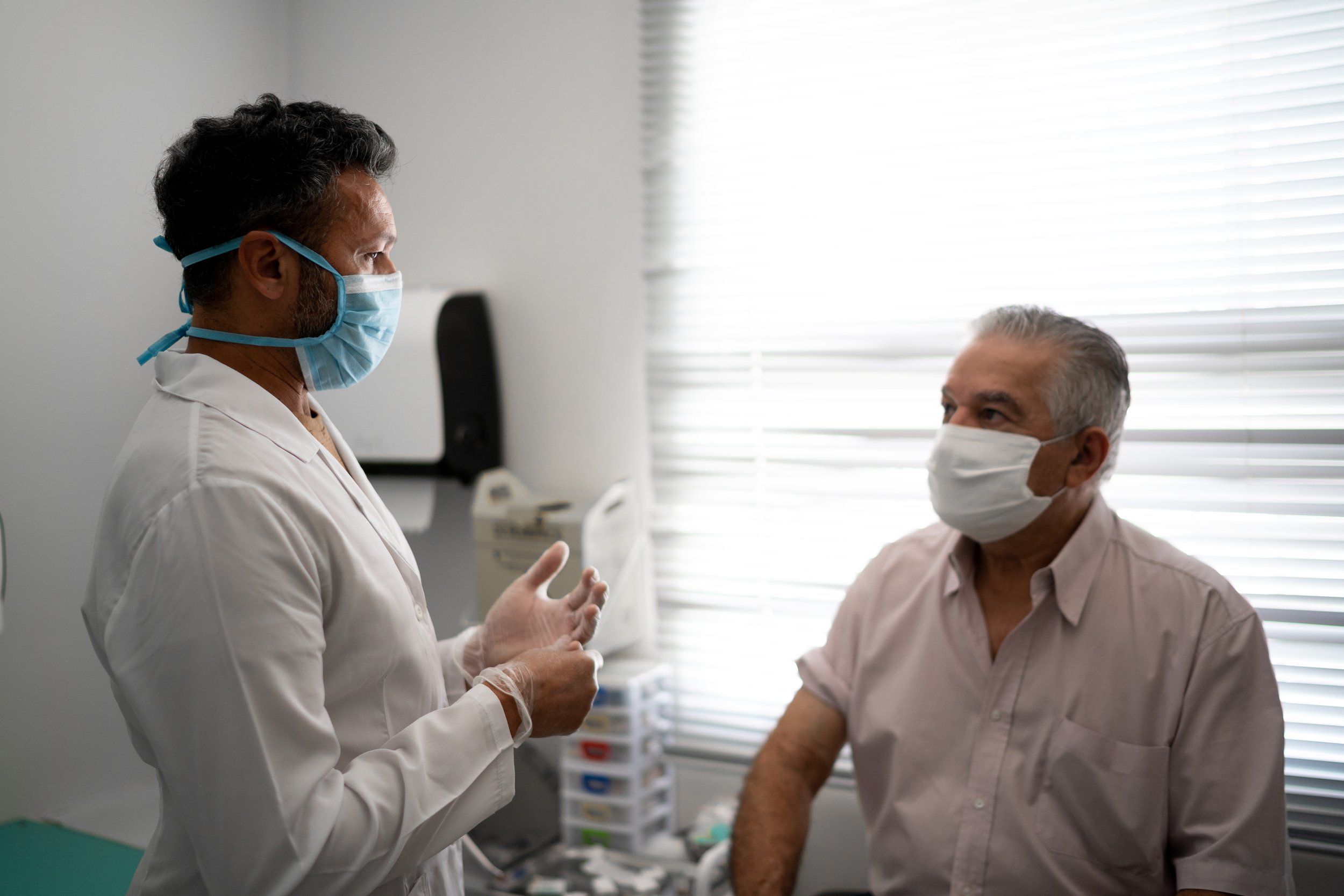Webinar: COVID-19 and the Latin Community
Thursday, January 7, 2021 | 11:00 AM - 12:00 PM CT
About the webinar
The COVID-19 pandemic continues to uncover health inequity concerns with the Latin Community. Comprising over 18% of the U.S. population, the Latin community is the largest racial/ethnic minority population in the U.S. However, with Latins comprising 34% of U.S. cases, the current systemic disparities in healthcare are once again magnified. Systemic inequities, including lack of access to care combined with front-line jobs, are among the top concerns of the Latin communities affected by the pandemic. The CDC illustrates that Latins face a higher risk of susceptibility to the complications of COVID-19 due to pre-existing chronic medical conditions such as diabetes, cancer, and heart disease. Research published by Salud America! indicates members of the Latin Community are three times as likely to get infected and be uninsured, and they are twice as likely to die from the virus than whites while having less access to testing kits. In one out of five Latin households, at least one of its members has lost a job in the last two months, making members of the Latin community the hardest hit by job losses. Furthermore, only 16.2% of Latins have the opportunity of working from home. This webinar examines causes and solutions that have made the Latin Community one of the most heavily impacted communities throughout the COVID-19 pandemic.
Webinar Moderator
Stephen Morales, MBA
Senior Vice President, Marwood Group
Stephen Morales is Senior Vice President with the Marwood Group where he provides strategic guidance for healthcare and life science corporations and investors. Prior to joining Marwood, Mr. Morales led strategy and diligence project teams at Navigant and L.E.K. Consulting, where he built a book of business related to the impact of healthcare reform on client contracting. As head of Navigant’s Chicago office, he developed thought leadership on risk-based contracting opportunities among providers, payors, employers, and suppliers. His 20-year healthcare career began in industry, working with large pharma companies like Baxter, Merck, Schering-Plough, and Guidant. He received his BS in Mechanical Engineering from MIT and his MBA from Duke’s Fuqua School of Business.
Webinar Panelists
Dr. Jorge Caballero, MD
Co-founder & Medical Director, Coders Against COVID
Jorge A. Caballero, MD, is the Co-founder & Medical Director of Coders Against COVID, a volunteer organization that creates a free, public, comprehensive directory of all of the nation's testing sites. Dr. Caballero also serves as Clinical Instructor of Anesthesiology, Perioperative and Pain Medicine at Stanford University School of Medicine. He is an accomplished product and business leader with 10+ years of experience developing innovative health care solutions. Dr. Caballero holds his BA in Chemistry with a minor in Biological and earned a MD from Stanford University.
Dr. Andrés E. González, MEd.
Vice President, Chief Diversity Officer
Froedtert & Medical College of Wisconsin
Andres Gonzalez has worked in the non-profit sector for over 20 years. He has been instrumental in creating culturally and linguistically competent programs. He serves as the Vice President, Chief Diversity Officer at Froedtert & Medical College of Wisconsin located in Milwaukee, WI. He provides direction to the Office of Diversity & Inclusion where he leads Diversity & Inclusion strategic initiatives that include: Business Resource Groups (BRGs), Community Engagement, Diversity Action Teams (DATs), Diversity & Cultural Competence Education, Emerging Markets Initiative, Health Equity, Language Services, Leadership Development, Supplier Diversity and Talent Acquisition.
In his previous role, Mr. Gonzalez served as the Chief Diversity & Inclusion Officer for Baystate Health in Springfield, MA from November 2012 to June 2015. He provided direction to the Office of Diversity & Inclusion where he led the strategic initiatives system wide that included: Business Employee Resource Groups (BERGs), Diversity Council, Leadership Development Initiative, Diversity & Cultural Competence Education, Supplier Diversity and New England’s premier Diversity Conference.
Mr. Gonzalez has worked in the community based sector providing leadership as Executive Director for Hispanic Urban Minority Alcoholism and Drug Abuse Outreach Program (UMADAOP), a chemical dependency prevention, intervention and treatment agency from October 1994 to December 2004. He also led efforts as the Executive Director of El Barrio, a workforce development agency that serves the Hispanic/Latino community in the Near West Side of Cleveland from January 2005 to February 2007.
Dr. Marisela Marrero, MD
President at Good Samaritan Medical Center -Steward Health Care
Marisela Marrero, M.D. is a Harvard-trained Emergency Room physician with an interest in developing top-tier public healthcare knowledge within the Latino community and broadening the use of proper healthcare among Hispanic people. Originally from Puerto Rico, Marisela has been living in the New England area for the past 24 years, having attained her undergraduate degree from Yale University and her medical degree from Harvard Medical School. She was the co-founder and chair of ALPFA Healthcare, an organization dedicated to the promotion and proliferation of Latino leaders. In addition to this, she served as the medical correspondent for both Telemundo Boston and NECN. Marisela worked as VP of Clinical Operations at Good Samaritan Medical Center, focusing on efficiency and throughput within the hospital setting, and in December of 2018, assumed the role of President at Good Samaritan Medical Center. As a leader in a healthcare organization that dealt with a substantial number of patients who suffered from COVID-19, Marisela has a more profound understanding of what it takes to lead a team that has the ability to be innovative, provide extraordinary care while remaining calm during the most perilous of times. With a sense of commitment and enthusiasm that is palpable, Marisela continues to raise the bar and acts as a driving force at the forefront of healthcare improvement and change.
Dr. Pilar Ortega, MD
President, Medical Organization for Latino Advancement
Dr. Pilar Ortega is an Emergency Physician and an Assistant Clinical Professor at the University of Illinois Chicago Departments of Emergency Medicine and Medical Education, where she directs and teaches the Medical Spanish program for the College of Medicine’s Hispanic Center of Excellence. Her roles in medical education and research focus on preparing medical students, physicians, and health systems to care for linguistically diverse patient populations.
Dr. Ortega is Co-founder and Immediate-Past President for the Medical Organization for Latino Advancement (MOLA), the Founder and Director of the National Association of Medical Spanish (la Asociación Nacional de Español Médico), and a member of Illinois Unidos, a statewide initiative that aims to present one united voice in stopping the growth of COVID-19 in our communities while addressing related public health issues and the devastating economic impact of COVID-19.
Some of Dr. Ortega’s recognitions have included her selection as part of the 2017 Crain’s Chicago Business 40 under 40 and as a recipient of Spain’s Royal National Academy of Medicine’s 2018 Award for Health Information, Communication and Dissemination. Dr. Ortega is a nationally and internationally recognized author, speaker, and researcher on the topics of language in health and medical Spanish education.
Share the webinar on social media with #COVID19HealthDisparities
Related Content










